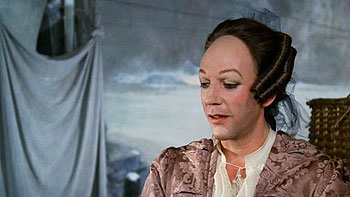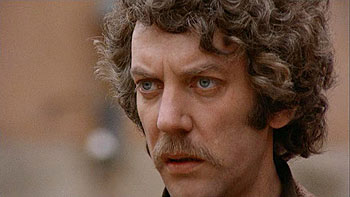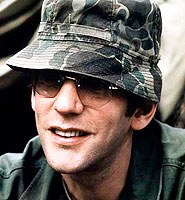What Would The ’70s Have Done Without Donald Sutherland?
Published on May 30th, 2012 in: Canadian Content, Issues, Movies, True Patriot Love |By Charlie M.
The Seventies were lucky to have Donald Sutherland. A quick look at his filmography suggests that whatever genre you’re interested in, there’s an iconic ’70s film with Sutherland at the heart of it. From comedy to sci-fi, from horror to war movie, like a human landmark, you can use him to orientate yourself around cult films of the era. His charisma is, in part, due to the fact there’s no other actor who looks quite like him—he’s magnetically sexy rather than conventionally attractive. More brutally, film director Fellini described him as “a sperm-filled waxwork with the eyes of a masturbator.”

Fellini’s Casanova, 1976
Fellini’s somewhat unflattering description was actually given to justify the casting of Sutherland as Casanova in the eponymous film. For modern audiences, used to happy endings and uncomplicated couplings, this surrealist take on the Venetian lover may be disturbing. The jerky, gothic direction and sumptuous costumes make everything feel grotesque, over the top—the characters are caricatures. Yet Sutherland is able to tread the line between explicit action and implied detachment; the more his character indulges in hedonism, the more poignant his lack of corresponding feeling seems. Portraying the famous seducer as a man unable to experience emotion fully, and unappreciated for his intellectual achievements is a twist that works well, but does not lead to the proverbial happy ending. Watching Casanova, you expect (and, perhaps hope) for an erotic thrill; you leave feeling unnerved by the coldness at the heart of it.
If your nerves need further jangling, look no further than one of the greatest science fiction films, Invasion of the Body Snatchers. For the bereft minority who have managed to avoid this classic, it is pretty much what it says on the tin: gelatinous aliens take over human bodies in a bid to control the earth. Sutherland, a long-suffering health inspector, juggles paperwork, domination-driven extraterrestrials, and a hideous macintosh with remarkable grace before delivering the film’s final shrieking twist—the celluloid equivalent of being dropped into liquid nitrogen as someone extracts your intestines through your ribcage. If you feel a little under-stimulated in life, or are unhappy about the location of some primary organs, click here to watch Sutherland bring a whole new dimension to podcasting.
Given the iconic status of Don’t Look Now, it’s remarkable is that it to has remained free from remakes—perhaps because the lead performances are so strong it seems unlikely the story would survive without them. The death of their daughter brings John (Sutherland) and Laura (Julie Christie) to Venice, where an unsettling combination of grief, mystery, and psychic edginess plays out amongst the backdrop of the city. Venice is such dark, vital presence in the film—almost alive itself—that a balancing intensity from the actors is crucial. Watching scenes from a marriage, experiencing the complicated emotional fallout of bereavement—the execution is so raw that it’s an uncomfortable ride through an outstanding film.

Don’t Look Now, 1973
It’s this intimacy by proxy that gives the film much of its power, and controversy; nearly 40 years later, there’s still debate about whether the sex scenes were “real.” Sutherland himself denies this, claiming the scene’s impact relied on good editing and the fact that, as he puts it, “audiences remember their own lovemaking.” A gothic combination of the occult and the psychology of loss, Don’t Look Now has been rightly voted one of the UK’s greatest films (British Film Institute survey).
When it comes to war films, the seventies-Sutherland combination produced three classics: Kelly’s Heroes, M*A*S*H, and The Eagle Has Landed. It’s notable that the first two of these include a hefty dose of black comedy. In particular, the role of Hawkeye shows Sutherland at his louche, depraved best, illustrating that irreverence may be the only sane response in the context of a horrific war. More lascivious than Casanova, Hawkeye’s lecherous, inebriated charm is balanced by his prowess as a surgeon.

M*A*S*H, 1970
Oscillating between fratboy pranks and reuniting body parts, Sutherland does as much with an eyebrow as he does with the script. It’s strangely difficult to quote M*A*S*H or recount some of the film’s funnier moments; the context and the delivery seem integral to its humor. Despite differences between the actor and director Altman, M*A*S*H nevertheless provided an opportunity for Sutherland to rise to fame and fortune, paving the way for later success.
It’s a tribute to his acting abilities that Donald Sutherland is equally convincing whether fending off soldiers or aliens. As a subversive army surgeon, a tender husband, a pod person, or an emotionally challenged Lothario, his range between films is as impressive as his range within them. My choice of top watches only scrapes the tip of the iceberg, and although the seventies owe Donald Sutherland a debt of unparalleled gratitude, it’s clear that his contribution is far from finished. In the words of the man himself: I’m going to be working until I’m helping them with the shovel.
3 Responses to “What Would The ’70s Have Done Without Donald Sutherland?”
May 31st, 2012 at 9:36 am
Oh my, a great piece!
I practically fell on the floor from Fellini’s description of him.
Big Sutherland fan here.
June 1st, 2012 at 5:35 am
Fantastic article. I couldn’t agree more. I look forward to hearing more about the Moustachioed Canuck in the 80s and 90s.
June 4th, 2012 at 12:48 am
[…] a Donald Sutherland lovefest over at Popshifer. It’s an extensive run through his ’70s filmography. Warning: it may cause an […]
Time limit is exhausted. Please reload the CAPTCHA.